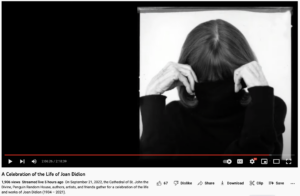
The memorial service for Joan Didion, who died December 23, 2021, was held this week at the Cathedral of St. John the Divine in New York City. (You can watch it here. There is no audio during the slideshow at the start.) Organizers explained the service had been delayed due to Covid, but it seems possible it took time to schedule the presence of so many notable celebrants, including writers Calvin Trillin, Jia Tolentino, and Hilton Als; poet Kevin Young; actor Vanessa Redgrave; former Justice Anthony Kennedy and former Governor Jerry Brown; and musician Patti Smith.
They and others read passages from Didion’s work, offer critical praise, sing, play music, or tell stories. Nephew Griffin Dunne repeats the well-known story about his swimsuit malfunction as a boy and how only Didion, going against the family mob, did not humiliate him.
Kennedy, a childhood friend, describes her as “pensive and happy in being so,” even as a teen at his family’s house after school.
What emerges is admiration for her independence and a kind of wonder and second layer of grief for how she lived apart from others in important ways. In photos shown from her life she is often out of step emotionally with what is going on around her—a cocktail party, a sitting with husband or child, a public event. She almost always looks thoughtful and sometimes stoic, sad, or worried-looking. In a photo of her in old age with the Obamas, upon receiving the National Humanities Medal, she is so tiny and frail—some say she weighed 70 pounds—that it looks like some commentary on what is possible.
Actress Susan Traylor, lifelong friends with Didion’s daughter, Quintana, says she once asked Didion worriedly how she would deal with going to big bad Castro’s Cuba; Didion replied she would drink Coca-Cola from glass bottles with no ice and wear long skirts with no underwear to prevent yeast infections.
Shelley Wanger, a senior editor at Penguin Random House, speaking on behalf of the Didion-Dunne family and her firm, says Didion had a “hardwired chill offset by her closet romanticism.”
Writer Susanna Moore says Didion was a good companion, even when silent, but not solicitous. She liked to laugh, Moore says, but loved irony most of all, which could make her seem disdainful.
“But then irony is a kind of disdain,” Moore says. “There is often a moral in it, too, if you know where to look.” She tells the story of how Didion watched Bianca Jagger read magazines all night at a party, which made her very angry. “Evil is the absence of seriousness,” Didion told Moore afterward.
The iconic photo of her that appears on a screen between speakers, holding up a cigarette, seems to watch and judge the celebration events, and this is exactly what we will miss. The seriousness—not without wit—she brought to the party was a consequence of her having stripped away her own preconceptions, which she said many times was a lifelong effort. Yet as Anthony Kennedy says, Didion taught us that we must learn “who we are,” in order to learn about the world around us.
New Yorker editor David Remnick says “it was hard to receive the news [of her death] as a shock”—he, we, all knew that she was 87 and in failing health—“and yet so many readers and so many writers absorbed the news of Joan’s death as a kind of devastation.”
He goes on to describe how Didion sent the New Yorker an essay defending the prose of Ernest Hemingway at a time that he had not only fallen out of favor but was being held up as a primary example of what is now called toxic masculinity. Remnick uses this in praise of Didion, but also as a warning that the mythologizing of Didion is also something extraneous.
“What is left behind is not the celebrity of the artist, running with the bulls at Pamplona, or kneeling beside a dead lion on the Serengeti plain, and not for that matter the shift dresses and sunglasses and adventures in Hollywood,” Remnick says.
“When I think about Joan Didion I think of her particular music, the powers of her memory, and her concentration. Her risks and her honesty. The unblinking deliberation she used to help us see the world more clearly and unforgettably. And I think of all those young readers—and we were once young readers too—who have been changed by their encounters with this recessive-seeming person, this immense spirit, this voice.”
